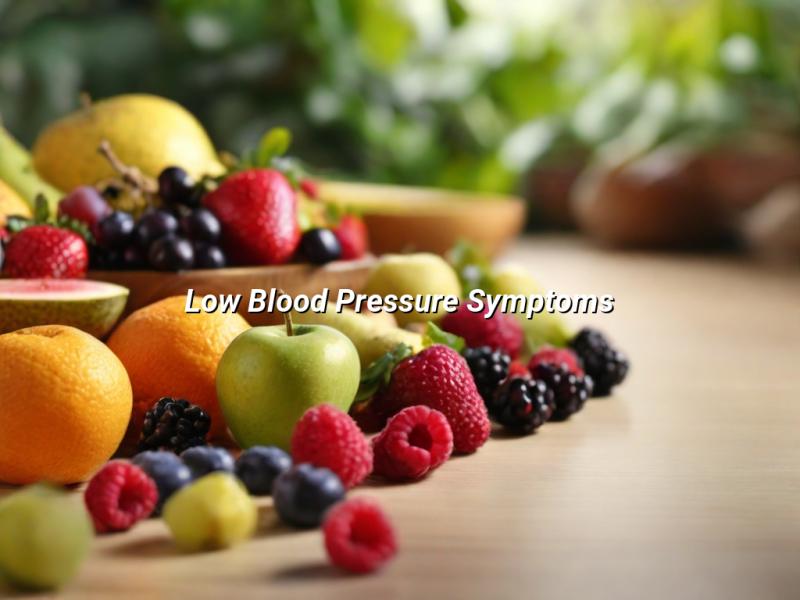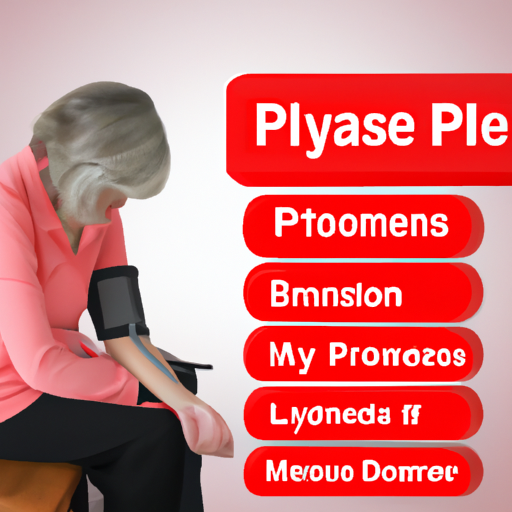Low Blood Pressure Symptoms

Understanding the Causes and Risk Factors of Low Blood Pressure
Low blood pressure, also known as hypotension, is a condition in which the pressure of the blood in your arteries is lower than normal. It can cause a variety of symptoms, including dizziness, fatigue, and fainting. While low blood pressure is usually not a cause for concern, it can be a sign of an underlying medical condition.
Understanding the causes and risk factors of low blood pressure can help you take steps to prevent it. Here’s what you need to know.
Causes of Low Blood Pressure
Low blood pressure can be caused by a variety of factors, including:
• Dehydration: Not drinking enough fluids can cause your blood pressure to drop.
• Medications: Certain medications, such as diuretics, beta-blockers, and some antidepressants, can cause your blood pressure to drop.
• Pregnancy: During pregnancy, your body produces more blood, which can cause your blood pressure to drop.
• Heart problems: Certain heart conditions, such as an irregular heartbeat or heart valve problems, can cause your blood pressure to drop.
• Endocrine problems: Conditions such as diabetes, thyroid problems, and adrenal gland disorders can cause your blood pressure to drop.
Risk Factors for Low Blood Pressure
There are certain factors that can increase your risk of developing low blood pressure. These include:
• Age: Older adults are more likely to develop low blood pressure.
• Gender: Women are more likely to develop low blood pressure than men.
• Medical conditions: People with certain medical conditions, such as diabetes, heart disease, and kidney disease, are more likely to develop low blood pressure.
• Medications: Taking certain medications, such as diuretics, beta-blockers, and some antidepressants, can increase your risk of developing low blood pressure.
• Diet: Eating a diet low in salt can increase your risk of developing low blood pressure.
• Lifestyle: People who are physically inactive or who have a sedentary lifestyle are more likely to develop low blood pressure.
If you think you may be at risk for low blood pressure, talk to your doctor. They can help you identify any underlying medical conditions and recommend lifestyle changes to help prevent it.
Recognizing the Signs and Symptoms of Low Blood Pressure
Low blood pressure, also known as hypotension, is a condition that affects many people. It can cause a variety of symptoms, ranging from mild to severe. Recognizing the signs and symptoms of low blood pressure is important, as it can help you take steps to prevent it from becoming a more serious problem.
The most common symptom of low blood pressure is lightheadedness or dizziness. This can be caused by a sudden drop in blood pressure, which can occur when you stand up too quickly or when you’re dehydrated. Other symptoms include fatigue, blurred vision, nausea, and fainting.
If you experience any of these symptoms, it’s important to seek medical attention. Your doctor can help you determine the cause of your low blood pressure and recommend treatment options.
In some cases, lifestyle changes can help improve your blood pressure. Eating a healthy diet, exercising regularly, and reducing stress can all help to keep your blood pressure in check. If your doctor recommends medication, it’s important to take it as prescribed.
If you’re experiencing any of the symptoms of low blood pressure, it’s important to take action. Recognizing the signs and symptoms can help you take steps to prevent it from becoming a more serious problem. Talk to your doctor about your symptoms and any lifestyle changes you can make to help improve your blood pressure.
Exploring the Complications of Low Blood Pressure
Low blood pressure, or hypotension, is a condition that affects many people. While it may not seem like a big deal, it can actually cause a variety of complications if left untreated. In this blog post, we’ll explore some of the potential complications of low blood pressure and what you can do to help manage it.
One of the most common complications of low blood pressure is dizziness and lightheadedness. This can be caused by a sudden drop in blood pressure, which can lead to a decrease in blood flow to the brain. This can cause you to feel faint or even pass out. If you experience these symptoms, it’s important to seek medical attention right away.
Another potential complication of low blood pressure is fatigue. This can be caused by a decrease in oxygen-rich blood to the muscles and organs, which can lead to a decrease in energy levels. If you’re feeling unusually tired, it’s important to talk to your doctor to determine the cause.
Low blood pressure can also cause blurred vision. This can be caused by a decrease in blood flow to the eyes, which can lead to a decrease in oxygen and nutrients to the eyes. If you’re experiencing blurred vision, it’s important to seek medical attention right away.
Finally, low blood pressure can also cause nausea and vomiting. This can be caused by a decrease in blood flow to the stomach, which can lead to a decrease in digestive enzymes and acids. If you’re experiencing nausea and vomiting, it’s important to seek medical attention right away.
If you’re experiencing any of these symptoms, it’s important to talk to your doctor to determine the cause. Your doctor may recommend lifestyle changes, such as increasing your salt intake or drinking more fluids, to help manage your low blood pressure. In some cases, medications may be necessary to help regulate your blood pressure.
Low blood pressure can be a serious condition, but with the right treatment and lifestyle changes, you can help manage it and reduce your risk of complications. If you’re experiencing any of the symptoms mentioned above, it’s important to talk to your doctor right away.
Investigating the Role of Diet and Exercise in Managing Low Blood Pressure
Welcome to the Low Blood Pressure Diet and Exercise Blog!
If you’re here, you’re probably looking for ways to manage your low blood pressure. We’re here to help! In this blog, we’ll explore the role of diet and exercise in managing low blood pressure.
First, let’s talk about diet. Eating a balanced diet is key to managing low blood pressure. This means eating plenty of fruits and vegetables, whole grains, lean proteins, and healthy fats. It’s also important to limit your intake of sodium, as too much sodium can cause your blood pressure to drop even further.
In addition to eating a balanced diet, it’s also important to stay hydrated. Drinking plenty of water throughout the day can help keep your blood pressure at a healthy level.
Now let’s talk about exercise. Regular exercise is essential for managing low blood pressure. Aim for at least 30 minutes of moderate exercise, such as walking, jogging, or swimming, five days a week. This will help keep your blood pressure in check and improve your overall health.
Finally, it’s important to talk to your doctor about any medications you may be taking. Some medications can cause your blood pressure to drop too low, so it’s important to make sure you’re taking the right dose.
We hope this blog has been helpful in understanding the role of diet and exercise in managing low blood pressure. Remember, it’s important to talk to your doctor before making any changes to your diet or exercise routine. Good luck!
Examining the Benefits of Medication for Treating Low Blood Pressure
Low blood pressure, or hypotension, can be a serious medical condition that can lead to a variety of health problems. Fortunately, there are a number of medications available to help treat low blood pressure. In this blog post, we’ll take a look at some of the benefits of taking medication for low blood pressure.
One of the most important benefits of taking medication for low blood pressure is that it can help to regulate your blood pressure. This is especially important if you have a condition that causes your blood pressure to fluctuate. By taking medication, you can help to keep your blood pressure at a healthy level.
Another benefit of taking medication for low blood pressure is that it can help to reduce the risk of complications. Low blood pressure can lead to a number of health problems, such as dizziness, fainting, and even stroke. By taking medication, you can help to reduce your risk of these complications.
Finally, taking medication for low blood pressure can also help to improve your overall quality of life. Low blood pressure can cause fatigue, which can make it difficult to do everyday activities. By taking medication, you can help to reduce your fatigue and improve your energy levels.
As you can see, there are a number of benefits to taking medication for low blood pressure. If you’re suffering from low blood pressure, it’s important to talk to your doctor about the best treatment options for you. With the right medication, you can help to keep your blood pressure at a healthy level and reduce your risk of complications.





